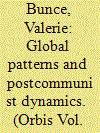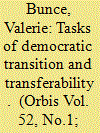|
|
|
Sort Order |
|
|
|
Items / Page
|
|
|
|
|
|
|
| Srl | Item |
| 1 |
ID:
162673


|
|
|
|
|
| Summary/Abstract |
Among the many scholarly attempts to reckon with the causes and consequences of Donald Trump’s rise, few have attracted popular attention on the scale of Steven Levitsky and Daniel Ziblatt’s How Democracies Die. Seldom do books by political scientists make it onto the New York Times best sellers list, but this one has, a testament to its broad influence. Levitsky and Ziblatt situate Trumpism within a broader comparative and historical context in order to assess its similarities to and differences from democratic breakdowns elsewhere, particularly in Europe and Latin America. Their broad argument is that modern slides into authoritarianism are not the result of revolutions or military coups, but rather the consequence of a steady erosion of political norms and the assault on such fundamental democratic institutions as an independent judiciary and a free press. In short, contemporary democracies die not as a result of men with guns attacking from outside the system, but rather because elected leaders from inside that system slowly undermine them. Judged from this standpoint, the authors argue that American democracy is now in real danger, and they offer a range of suggestions for saving it. How convincing is Levitsky and Ziblatt’s analysis of democratic breakdown, and how well does it apply to the American case? How useful are the solutions that they offer for rescuing American democracy? We have asked a range of prominent scholars from across the discipline to consider these questions in the present symposium.
|
|
|
|
|
|
|
|
|
|
|
|
|
|
|
|
| 2 |
ID:
170200


|
|
|
|
|
| Summary/Abstract |
Based on their quantitative survey of democracy protests from 1989 to 2011, Dawn Brancati and Adrian Lucardi conclude that diffusion of such protests is the exception, not the rule; that domestic factors rather than international diffusion are key in determining if diffusion occurs and that their findings call into serious question the received wisdom about democratic diffusion. We have several problems with their analysis. First, no serious scholar of diffusion has claimed that the diffusion of subversive innovations supporting democracy is common or frequent, given the difficulties involved. Their conclusion that such diffusion is not common thus echoes, rather than challenges those of many scholars of diffusion. Second, their conclusion that domestic factors are primary in rejecting or sometimes supporting democratic change is also unsurprising. Virtually every empirical account and every theory of cross-national diffusion identify variation in domestic receptivity to change as a key element in determining if diffusion occurs, and its limits. Finally, we question the authors’ decision to limit their analysis of diffusion to protests. Innovative challenges to authoritarian rule have taken many additional forms, including roundtables and legal challenges, as well as voter registration and get out the vote drives, agreements among opposition parties, work by civil society organizations, and participation in transnational networks of democracy activists, in addition to protests. Democracy protests are in fact a small and perhaps unrepresentative part of challenges to authoritarian rule; they are likely the result of a series of innovative actions that are hard to quantify and hard to trace, and for this reason are missing from Brancatii and Lucardi’s analysis. Their analysis, therefore, does not challenge the accepted wisdom on diffusion, but, in fact, lends partial support to its conclusions, support that is limited by the kinds of data collected and the authors’ understanding of both innovation and diffusion.
|
|
|
|
|
|
|
|
|
|
|
|
|
|
|
|
| 3 |
ID:
073656


|
|
|
|
|
| Publication |
2006.
|
| Summary/Abstract |
Many of the new democracies that have been formed since the fall of the Soviet Union in 1991 lack what had long been understood as preconditions for the democratic project: an earlier history of democratic politics, high personal incomes, a large middle class, and/or settled borders. The most distinctive aspects of this wave of democratic transitions are rapid regime change and the rise of democracies that exhibit a mixture of both authoritarian and democratic elements. This article explores what these new democracies can teach us about the factors that seem to encourage a transition from dictatorship to democracy, and what factors seem to contribute to its sustainability and institutionalization.
|
|
|
|
|
|
|
|
|
|
|
|
|
|
|
|
| 4 |
ID:
152133


|
|
|
|
|
| Summary/Abstract |
From 1998 to 2005, six elections took place in postcommunist Europe and Eurasia that led to the defeat of authoritarian incumbents or their anointed successors, the empowerment of opposition forces, and, thereafter, the introduction of democratic reforms. Because Putin's regime closely resembles those regimes that were successfully challenged by these dramatic changes in politics, Russia is a logical candidate for such a “color revolution,” as these electoral turnovers have been termed. Moreover, the color revolutions have demonstrated an ability to spread among countries, including several that border Russia. However, the case for a color revolution in Russia is mixed. On the one hand, the many costs of personalized rule make Putin's Russia vulnerable. On the other hand, Putin has been extraordinarily effective at home and abroad in preempting the possibility of an opposition victory in Russian presidential and parliamentary elections.
|
|
|
|
|
|
|
|
|
|
|
|
|
|
|
|
| 5 |
ID:
080756


|
|
|
|
|
| Publication |
2008.
|
| Summary/Abstract |
There is no single road to democracy. However, there are some factors that seem to have consistently positive effects on democratic development. These include the existence of a large and diverse civil society; a sharp political break with the authoritarian past, followed by regular turnovers in political leadership and governing parties; stable state borders; and political institutions which empower parliaments and, in culturally diverse societies, give minorities political voice without locking them into permanent coalitions that block collaboration across group divides in pursuit of common goals. Less important are economic considerations-though economic reforms are far more likely in democratic settings than in authoritarian regimes and far more supportive over the medium- and long-term of robust economic performance
|
|
|
|
|
|
|
|
|
|
|
|
|
|
|
|
|
|
|
|
|